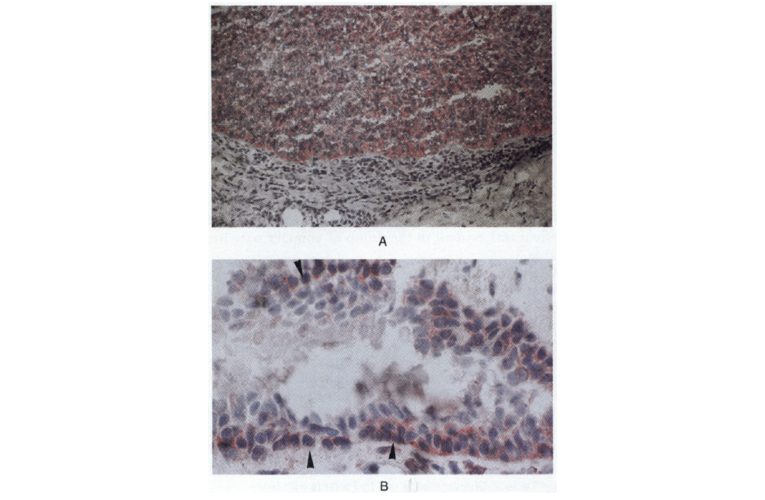Cat. #151406
Anti-BCL2 [bcl-2/100] mAb
Cat. #: 151406
Sub-type: Primary antibody
Unit size: 100 ug
Availability: 1-2 weeks
Target: Bcl2
Class: Monoclonal
Application: IHC ; WB
Reactivity: Human
Host: Mouse
£300.00
This fee is applicable only for non-profit organisations. If you are a for-profit organisation or a researcher working on commercially-sponsored academic research, you will need to contact our licensing team for a commercial use license.
Contributor
Inventor: Jacqueline Cordell
Institute: University of Oxford
Primary Citation: Pezzella et al. 1990. Lancet. 336(8729):1510-1. PMID: 197911
Tool Details
*FOR RESEARCH USE ONLY
- Name: Anti-BCL2 [bcl-2/100] mAb
- Clone: bcl-2/100
- Tool sub type: Primary antibody
- Class: Monoclonal
- Conjugation: Unconjugated
- Reactivity: Human
- Host: Mouse
- Application: IHC ; WB
- Description: Monoclonal antibody directed against both isoforms of BCL-2 protein.
- Immunogen: Synthetic peptide of amino acids 41-54 of human bcl-2 oncoprotein
- Immunogen uniprot id: P10415
- Isotype: IgG1
- Myeloma used: P3/NS1/1-Ag4.1
Target Details
- Target: Bcl2
- Target background: The pro-survival protein BCL2 derives its name from B-cell lymphoma 2, as it is the second member of a range of proteins initially described in chromosomal translocations involving chromosomes 14 and 18 in follicular lymphomas. There are two isoforms, alpha and beta, of Bcl-2 have been identified and are a result of alternative splicing at the C-terminus. BCL-2 protein is involved in apoptosis, and inhibits the function of pro-apoptotic proteins such as Bax and Bak. Damage to the Bcl-2 gene has been identified as a cause of a number of cancers, including melanoma, breast, prostate, chronic lymphocytic leukaemia, and lung cancer, and a possible cause of schizophrenia and autoimmunity. It is also a cause of resistance to cancer treatments. This antibody recognises both the alpha and beta isoforms of BCL-2.
Applications
- Application: IHC ; WB
Handling
- Format: Liquid
- Concentration: 8 mg/ml
- Unit size: 100 ug
- Storage buffer: PBS with 0.02% azide
- Storage conditions: Store at -20° C frozen. Avoid repeated freeze / thaw cycles
- Shipping conditions: Shipping at 4° C
References
- Hirpara et al. 2020. Redox Biol. 30:101403. PMID: 31954371.
- Steinbach et al. 2020. PLoS One. 15(1):e0227676. PMID: 31935257.
- Jeffery et al. 2017. Clin Exp Immunol. 188(3):394-411. PMID: 28176332.
- Soilu-Hänninen et al. 1999. J Neurosci. 19(12):4828-38. PMID: 10366617.
- Navratil et al. 1995. J Clin Pathol. 48(1):18-21. PMID: 7706514.
- Ashton-Key et al. 1995. Histopathology. 26(1):75-8. PMID: 7713486.
- Piris et al. 1994. Br J Cancer. 69(2):337-41. PMID: 8297731.
- Leek et al. 1994. Br J Cancer. 69(1):135-9. PMID: 8286195.
- de Jong et al. 1994. Cancer Res. 54(1):256-60. PMID: 8261449.
- Pezzella et al. 1993. N Engl J Med. 329(10):690-4. PMID: 8393963.
- Doussis et al. 1993. Am J Clin Pathol. 99(6):663-7. PMID: 8322700.
- Pezzella et al. 1993. Histopathology. 22(1):39-44. PMID: 8436340.
- Gaulard et al. 1992. Am J Pathol. 140(5):1089-95. PMID: 1374590.
- Pezzella et al. 1992. Br J Cancer. 65(1):87-9. PMID: 1733447.
- Pezzella et al. 1990. Lancet. 336(8729):1510-1. PMID: 1979117.




